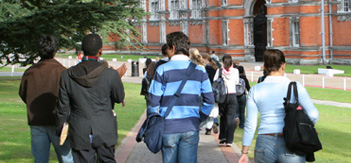Step 3: Find the Right Fit
Find out what kind of school is the best match for your goals
What's your career goal?
What are you into? What makes you curious and excited to learn more? The career you want to pursue has a big impact on what college or certification program you will choose.
This is a big question, but there are tools to help you narrow your focus. If you are a middle or high school student in Kentucky, your Individual Learning Plan (ILP) has all different types of assessments and tools to help. The ILP will even recommend careers that match what you like to do with actual jobs and help you understand what it's like to work in that field, how much you can get paid, and what education or training is needed after high school.
If you're not currently in school, here's some other great (and free) tools to help you explore careers that might be a good fit for you:
- Check out these video tips on finding a career and a college major
- Find three steps to get started exploring careers
- See how your skills match a career at CareerOneStop rom the U.S. Department of Labor
- Check out different careers at LearnHowtoBecome
What’s the right match?
Find out what kind of school is the best match for your career goals.
The kind of college you choose to attend should reflect your goals and your personality. Whether you choose a public, private, community, technical, trade, or even online college, make sure it’s the best match for you.
Big or small?
Do you want to attend a big university with a greater choice of studies and social activities, but also larger lecture classes? Or would you like fewer choices but more personal attention and a greater chance to stand out? You decide.
Home or away?
Attending a local college versus boarding out of state—what’s better? It depends. For some, residence hall life is an important part of the college experience—but commuting from home is less expensive.
Which major works?
Figuring out what you like doing most, plus what you’re best at, can point to the careers you should consider—and what majors will help you reach your career goal.
Why extras matter.
Getting into extracurricular activities outside of class—band, science club, the school newspaper, or drama—or even volunteering at local organizations helps you discover what your real interests are—and where you’re heading.


